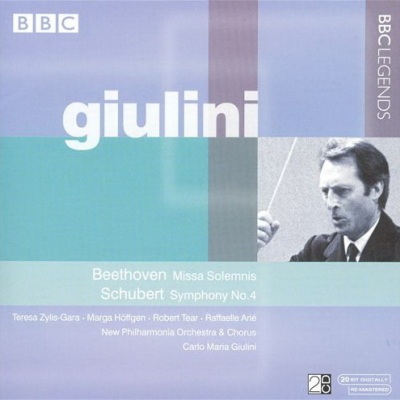
Beethoven: Missa Solemnis / Schubert: Symphony No. 4
"Von Herzen - Möge es wieder - zu Herzen gehen!" ("From the heart – may it go – to the heart!"); these are the words Beethoven wrote at the head of his monumental Missa Solemnis. Whatever the precise purpose of the inscription, there is no doubting the overwhelming emotional and spiritual impact of this work in a worthy performance. Carlo Maria Giulini was, in many ways, an ideal interpreter. His grounding in Italian opera makes him alert to the powerful dramatic scenarios evoked by the music. But he was also, of course, a most sensitive conductor in the classical symphonic repertoire, and his feeling for the architecture of the work is palpable. So is his awareness of the wonderful textural contrasts that Beethoven employs, perhaps the most striking being the transition from the Sanctus into the Benedictus. Here, exultant Osannas give way to a mysterious Praeludium, scored mainly for lower woodwind and strings, with quiet organ. As the Praeludium dies away in the orchestral depths, a solo violin enters ethereally on its top G, accompanied by nothing more than two flutes – a vision of the Holy Spirit descending to earth from on high, and sublime in its beauty. Giulini brings this off, and other comparable moments of intense poetry, with perfect judgement allied to a great simplicity, which is exactly what is needed. It underlines his greatest gift as a performer, his humility, and his ability to subjugate himself totally to the wishes of the composer and the requirements of the work in hand. In this quest, he is most ably assisted by the other performers. The Philharmonia Chorus was at its very best at this time, and sings magnificently, all parts negotiating the horrendous difficulties of the choral writing with apparent ease and glorious tone. It is a great pity, by the way that the inspirational work of their chorus-master, Wilhelm Pitz, is not credited. His work contributed so much to many great recordings of this period, such as Klemperer’s Mahler 2, or Giulini’s own Verdi Requiem and 4 Pezzi Sacri. But let this pass – we should thank the BBC for issuing this memorable performance. It has to be pointed out, though, that the circumstances in which it was recorded were far from ideal. St. Paul’s is a cavernous building with a notoriously lengthy echo. The engineers did a remarkable job, but they couldn’t negate the properties of the building. The result is that the sound is inevitably mushy and confused for some of the time, and much important detail – the woodwind writing is a special joy in this work – gets submerged. The microphone placings have also rendered it somewhat lop-sided, so that the altos and basses of the chorus lose out in comparison to the sopranos and tenors. The same is true in the case of the four soloists, though they make a very impressive and well balanced team. Zylis-Gara has the most demanding part, with high Bs and Cs in the Benedictus, and she sings with unforced expression and youthfully fresh tone. The two disc-set is completed by an account of Schubert’s c minor Symphony, the so-called "Tragic Symphony". It is a very immature work, which in no way really lives up to its soubriquet. But it has many lovely things in it, and also many of Schubert’s ‘fingerprints’ – the delicious melodies, the harmonic side-slips, the sure sense of instrumental colour etc. It is here given an affectionate performance by Giulini and the New Philharmonia. Returning to the Missa Solemnis for a moment, I suppose the ultimate triumph of the performance is that it makes one constantly marvel at the awesome imagination which created this piece, one of the summits of European art. Giulini leads us to that summit with quiet assurance and consummate skill. -- Gwyn Parry-Jones, musicweb-international.com
